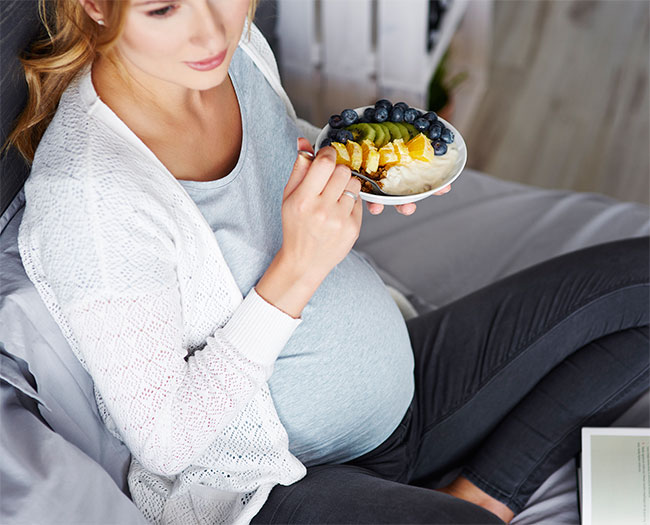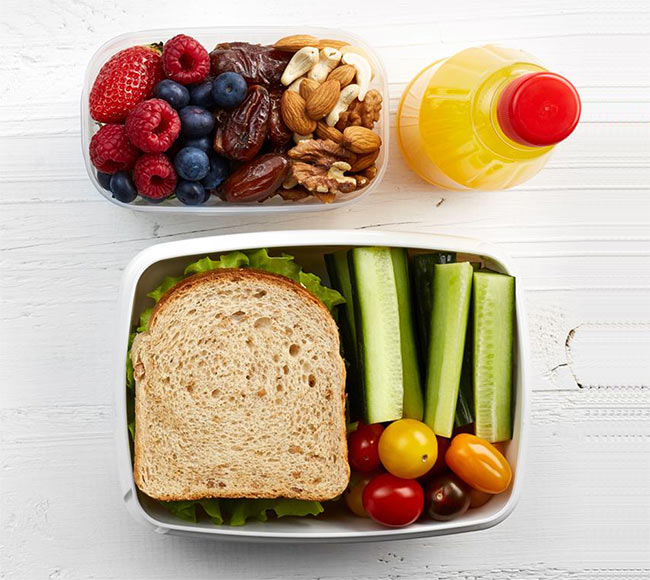7 Essential Nutrients Needed for Healthy Pregnancy

Your body utilizes many nutrients from food that play a role in growing a baby that is healthy and strong. These seven are of extra importance because they’re needed in greater amounts while you’re pregnant, are essential to preventing birth defects, and/or are typically nutrients that many women don’t get enough of.
1. Calcium
Calcium is important for developing strong bones and teeth (for you and baby) as well as maintaining normal muscle contraction, blood clotting, and heart rhythm. Women typically meet only about 75% of their calcium needs. If you don’t get enough from your diet or supplements, baby takes what he or she needs from your bones!
Amount: Pregnancy and lactation: 1000 mg/day
Where to Get it:
Food: Low-fat dairy products like 1% or skim milk, low-fat yogurt, and low-fat cheese.
Other sources: sesame seeds, tofu, broccoli, canned salmon with bones; fortified foods (orange juice, non-dairy milks, breakfast cereals, and cereal bars).
Supplements: Recommended if you do not consume enough dairyproducts or fortified foods.
2. Vitamin D
Without this vitamin, your body (and baby’s) can’t use calcium. Recent research also shows that vitamin D is vital to genetic imprinting, which may affect your baby’s susceptibility to chronic disease later in life. Although vitamin D is made in your skin through exposure to UV light, research shows most people living in northern latitudes don’t make enough throughout the year to meet their needs.
Amount: Pregnancy and lactation: 1000 IU/day
Where to get it:
Food: Vitamin D fortified milk, salmon, some brands of yogurt (read the label), and some mushrooms.
Supplements: Many calcium supplements also contain vitamin D, as does your prenatal vitamin—but an additional supplement may be needed.
3. Iron
Iron is needed to produce red blood cells and transport oxygen throughout the body. During pregnancy, you are producing more blood and iron needs increase. It’s especially important to get enough iron while pregnant because your baby will need to store enough iron to last through their first few months after birth!
Amount: Pregnancy: 30 mg/day (You need supplemental iron in addition to eating iron-rich foods.)
Lactation: 9mg/day
Where to get it
Food: Lean red meat, fish, poultry, dried fruits, iron-fortified cereals, and dried beans and peas.
Supplements: Look for a prenatal vitamin that contains 30mg of iron (Fe).
4. Protein
Protein contains amino acids, which are essential building blocks for human tissue. Adequate protein helps maximize fetal brain
development, particularly in the last trimester. It also protects against pregnancy complications such as preeclampsia and poor placental function.
Amount
Pregnancy: About 60 g/day Carrying twins: 75 g/day
Lactation: 65 g/day
Where to get it
Food: Lean meat, poultry, and fish; dried beans, nuts, eggs, cheese, and dairy products.
Supplements: Usually there’s no need for shakes, bars, or other protein supplements.
5. Folic Acid
Folic acid is a B vitamin that is involved in fetal cell division. Getting enough folic acid during your first trimester is extremely important for preventing birth defects called neural tube defects. Later in pregnancy, folic acid is important for the formation of red blood cells (yours and baby’s).
Amount
Pregnancy: 600 mcg total (400 mcg from fortified foods and/or supplements and 200 mcg from food)
Lactation: 500 mcg
Where to get it
Food: Leafy greens, legumes, citrus fruits and juices, and whole wheat bread.
Synthetic sources: Fortified foods like breakfast cereals or other grains; supplements like prenatal vitamins.
6. DHA
An essential fatty acid important for the development of baby’s brain and vision. A developing baby’s brain requires 50 to 70 mg of DHA each day during the third trimester for optimal growth and that DHA comes from mom’s diet (mom needs to eat an average of 200 mg/day to meet mom and baby’s requirements).
Amount
Pregnancy and lactation: 200 mg/day
Where to get it
Food: Wild salmon (fresh, canned), herring, mackerel (not king), sardines, anchovies, tuna, trout, Pacific oysters, omega-3–fortified eggs, ground flaxseed, walnuts, seaweed, walnut oil, canola oil, and soybeans.
7. Choline
Choline is an essential nutrient, meaning your body can’t make it on its own. It is the building block for acetylcholine, a neurotransmitter involved in memory. The bonus is, not only can it be good for your brain to get enough choline, it also plays a role in baby’s brain development, as researchers suggest women can boost the cognitive function of their baby by getting enough choline.
Amount
Pregnancy: 450 mg/day
Lactation: 550 mg/day
Where to get it
Food: Egg yolks, beef, milk, soybeans, citrus, wheat germ, and nuts.

17 Yoga Practices for Third Trimester in 30 Minutes
In the third trimester your body continues to adapt as it creates space for your baby and gets re...

Importance of Pelvic Floor Exercise in Pregnancy and How to Do it Easily
It is very normal to worry about your pelvic floor and the sensitive perineum during labor, but t...

10 Practical Baby Shower Gift Ideas
As the excitement of a new arrival fills the air, celebrating with a baby shower is a cherished t...

12 Essential Things to Pack in Pregnancy Handbag
Pregnancy is a beautiful and transformative journey, but it comes with its unique set of challeng...

18 Things To Do While Nesting Before Baby Arrives
As expectant parents, you may have experienced the overwhelming desire to nest, an instinctual ur...

12 Natural Ways to Prevent and Manage Nausea During Pregnancy
Nausea and vomiting, often referred to as morning sickness, can be one of the less pleasant aspec...

15 Tips to Avoid Unwanted Weight Gain in Pregnancy
While weight gain is a natural part of pregnancy, maintaining a healthy weight is important for b...

12 Tips to Help you in Preparing for Natural Labor
Natural labor, also known as unmedicated or drug-free labor, allows you to connect deeply with th...

Easy Prenatal Yoga Exercises During Pregnancy
Prenatal yoga offers a gentle and holistic approach to staying active, relieving discomfort, and ...

10 Important Things to Do Before the Arrival of Baby
Pregnancy time period is exciting and exhausting at the same time. Nobody can prepare you what yo...

10 Tips to Choose Best Maternity Clothes in Last 4 Months
Last four months of pregnancy can be quite difficult when one of the issue is that you cannot dec...

6 Books You Should Read During Pregnancy
When you are tired of reading all sort of information from digital devices, it is better to hold ...

10 Skin Care Ingredients to Avoid During Pregnancy
During pregnancy, it is essential to be cautious about the skincare products you use to ensure th...

The Right Way of Sleeping for Pregnant Women
Sleep is essential for overall well-being, and it becomes even more crucial during pregnancy. As ...

8 Foods to Avoid for a Healthy Pregnancy
During pregnancy, proper nutrition is essential to support the health and development of both the...

10 Tips For a Comfortable Pregnancy To Survive The Summers
As the summer sun shines brightly, expectant mothers may find themselves facing unique challenges...

Exercise Benefits of Pregnancy Ball
During pregnancy, maintaining an active lifestyle is essential for the well-being of both the mot...

5 Safe Essential Oils During Pregnancy for Physical and Mental Health
Aromatherapy can be a wonderful way to relax, unwind, and address various pregnancy discomforts n...

Best Pregnancy Workouts to Keep You Fit
Staying active during pregnancy is generally considered beneficial for both the mother and the ba...

Dealing With Unhealthy Pregnancy Cravings - What You Need To Know
Pregnancy is a transformative experience for women, both physically and emotionally. With all the...




